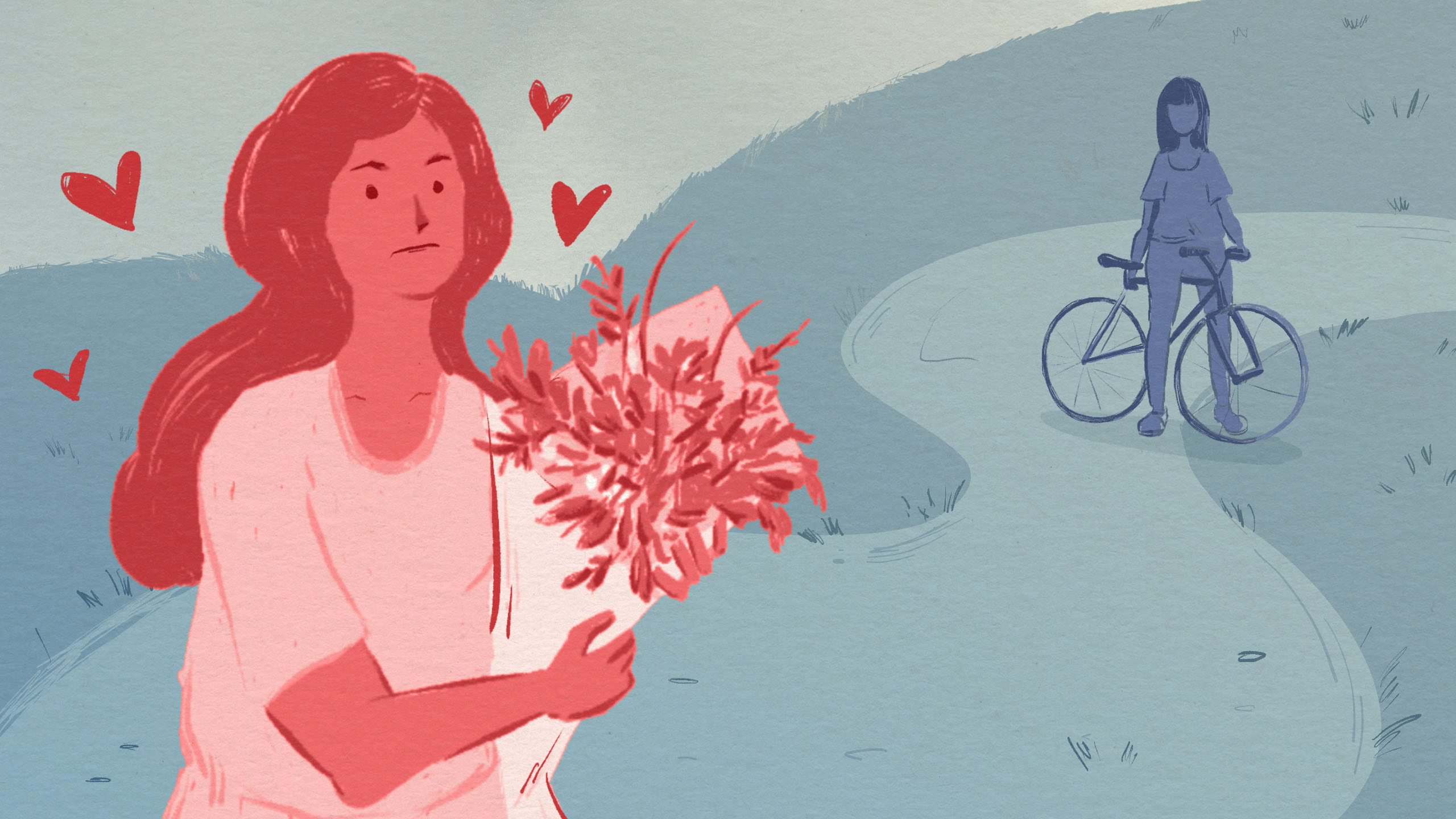“This sounds like … something that happens to you too often,” my friend Aaron texted me after I told him that I was starting to suspect that my girlfriend of a few months was pulling away.
I laughed out loud, not because he was wrong or because it was funny, but because he was painfully accurate. Aaron had seen me through all of my queer relationships after coming out in my late 30s, most of which were rocky to some degree: the off-and-on roller-coaster relationship with the first woman I ever dated, or the one who got too drunk too often and would go AWOL on our plans, or the one who regularly gave me the silent treatment.
Yet the story with her had a cute start. Our first date, during pandemic lockdown, was a virtual one where we spent hours asking “getting to know you” questions she’d found online. We met for coffee in the park another time, but I pulled back, feeling dismissive of our age gap, which was more than 10 years. But we ran into each other again over a year later, which led to some park hangs over pizza and drinks on patios. A romance was sparked.
Our intellectual and emotional connection caught fire sexually. We’d entirely miss sleep some nights except for the few times we’d doze off unwillingly. I’d lie beside her with my head tucked into the nook at the base of her neck, and we’d chatter on about writing or previous relationships or some drama one of our friends was currently going through. We’d burst into laughter at a joke one of us cracked—clever wordplay or a callback—have snacks in bed at 2 a.m., then have more sex, all in an endless cycle.
We’d ask each other questions from “We’re Not Really Strangers,” a card game that’s meant to build meaningful connections with questions like: What were your first impressions of me? What’s the most emotional pain you’ve ever been in? What about me most surprised you? It felt like we were actively trying to transform ourselves from strangers into lovers.
Sometimes she’d lie on top of me, her head resting on my chest, while I’d play with her short, bleach-blonde hair. One afternoon in bed while she lay there, and I felt the comfort of her weight against me, I read aloud from a book, my favourite Lydia Davis short story called “Break It Down,” where a man recounts a brief romance that just ended, and tries (unsuccessfully) to put a monetary value to it, to see if it was “worth it.” As I read aloud about heartbreak to her, for the first time in a very long time, I fell in love.
It was heavenly to be so immersed in the moment with another person; if other things existed in this world, we certainly weren’t aware of them. Only a few months in, love came quite easily, first being said in other words: “I like you so much,” I’d say, “I think I’m going to like you for a long time,” she’d say. We used more words than necessary to say “I love you” without saying it, until we did.
At this point in my life, I had found stability in my relationship to myself and was ready to let someone else in. Two years earlier, I had had a spiritual breakdown after a breakup that led me to the painful realization that I was a people-pleaser. The crisis helped me realize how I had bent myself into different shapes for other people, hoping to become someone they’d love. During that period of soul searching, I healed the parts of me that felt the need to do that. I wasn’t doing that anymore.
“I could take that partition down. I felt close to her and welcome in her life, and like she wanted to be a part of mine.”
My seven-year-old daughter always wanted to be near my girlfriend, and the happiness I felt as the three of us sat twisted up like pretzels on my couch filled my heart to new levels. It was partly relief at finally being able to let the two separate parts of my life combine—my motherhood and my relationship—and partly hope, because I could see a glimpse into a future I hadn’t imagined possible. Now with someone wanting to see and love all sides of me, to be with all of me, I could take that partition down. I felt close to her and welcome in her life, and like she wanted to be a part of mine.
I spent many months falling in love with and getting to know this version of her: the one who’d bike over just to give me a kiss on her way out for the night, who’d plan cute date nights for us, who’d walk my daughter to school with me in the morning. I was caught unaware by a new version that would soon emerge, an unfamiliar one that seemed in stark contrast to the first: her warmth turned cold, her tenderness hardened.
Her focus had shifted to her work, she claimed. Her suggested solution was for me to date other people; having my needs met elsewhere meant she could come and go as she needed. This suggestion, accompanied by a complete withdrawal of intimacy, seemed like a trade-off that swung us back in the direction of strangers.
When I asked her about the shift I’d noticed, and whether or not her feelings had changed, she explained that what we’d been doing wasn’t sustainable for her.
“Emotionally or time-wise?” I asked.
“Her feelings for me hadn’t changed, she claimed, yet loving words disappeared from her vocabulary.”
“Both,” she replied. This version of her, she told me, was more genuine. I wondered, who had she been with me before?
Her feelings for me hadn’t changed, she claimed, yet loving words disappeared from her vocabulary. All the flirtiness and playfulness and “I love you’s” were a thing of the past. Our exchanges, now largely limited to text, became mundane, superficial and artificial.
Our texts became a breeding ground for misunderstanding. One time, I fought for time to talk and clear the air; I was squeezed in between her other plans. She no longer actively made plans with me; they became either tentative or last minute or nonexistent.
I wanted so little, but even that seemed like too much.
Communicating with her became a slippery endeavour, and my attempts to see her were met with perfect excuses. She now had little time for me in person. Even her language started to exclude me; the “we’s” turned to “I’s.” “Do you want to go climbing with me this week?” I’d ask. “I might go tomorrow,” she’d reply.
The ease that once existed between us was now tight and uncomfortable. One night near the end of our relationship, we went to see a play and on the way there she could barely look me in the eyes. When I reached for her hand as we walked, it lay limp in mine. During the performance, she squirmed around uncomfortably in her seat beside me. When I asked her if she was cold, she said no. I questioned whether or not to reach out and touch her, her discomfort was so palpable.
On what ended up being the last time that she slept over at my house, she was turned away from me all night. It was the only time, after months, that she didn’t sleep almost completely wrapped around me.
“When she saw me in her path, I saw her body shift like she considered turning back to avoid me. She didn’t, but that brief moment told me so much.”
Maybe the most telling moment was more subtle than this. One morning while walking my dog, I saw her from afar. When she saw me in her path, I saw her body shift like she considered turning back to avoid me. She didn’t, but that brief moment told me so much.
I never could have imagined that it would end so coldly. I admit that I turned a bit cold too, having repeatedly had my affection rebuffed and misinterpreted. I found myself speaking in a new language that was almost businesslike at times, one that was disconnected from the warmth I felt for her because I was angry and hurt over how the intimacy between us had been extinguished.
I had been here before, my body reminded me, as newfound anxiety crept in. A few years earlier, I would have gaslit myself, questioned my own perception of her behaviour and of the change in energy. I even would have blamed myself for it. This time, though, I knew I wasn’t imagining things. I also knew that the shift hadn’t originated with me. I trusted myself enough to accept what I was experiencing.
I mourned the relationship as I was still in it. I hadn’t changed, but everything about us had. The doors to her world felt shut, and I felt both stupid and angry for being so wrong about what this was and could be.
Having reached the point where I was ready to dive deeper into knowing her, she was bringing us back up to the surface, like a pair of scuba divers with their dive cut short, having just barely made it past the seaweed. I felt like the only one excited about the descent.
She told me that she read my desire for continued connection and closeness as insecurity, as the threat of codependence. In that moment, I felt our two different realities collide.
“Nothing I could say or do would change how she saw me. Although I had compassion for her need to have these walls, I was no longer a person who would desperately try to climb them.”
As a mostly recovered people-pleaser, I had, after a lifetime of subordinating myself to others’ needs, allowed myself to have needs. Her accusation was enraging. But my anger was a sign of my growth. A few years earlier, I would have swallowed my needs, if I was even able to identify them at all. This anger was based on knowing how wrong she was.
It had taken me a few years of healing to change my narrative, to become my own best friend, to be in a place where being alone no longer meant being lonely. Now here I was stuck in her narrative. Nothing I could say or do would change how she saw me, though I knew her behaviour didn’t reflect me or my worth. Although I had compassion for her need to have these walls, I was no longer a person who would desperately try to climb them.
This felt like my final exam of healing and I didn’t need to ace it; I just wanted to pass.
This relationship had shown me what I wanted: a deep kind of love. I was not only capable of it, but finally felt worthy of it, and brave enough to let go of this complicated and tortured kind of love—the kind that used to feel worthwhile to me. The true test of a relationship is how it feels, and what I was asked to give up didn’t feel right.
Already past the falling in love phase, I had reached the point when love had become a choice, one that I wanted to make, one way or the other. As the novelist Louis de Bernières wrote, “Love itself is what is left over when being in love has burned away.” It was there, in the ashes, that I had to choose myself.
Maybe we burned too bright too fast, fuelled too fiercely at the beginning. Maybe a love that burns more slowly is less likely to extinguish, as it gradually reveals the layers that turn strangers into lovers.


 Why you can trust Xtra
Why you can trust Xtra


